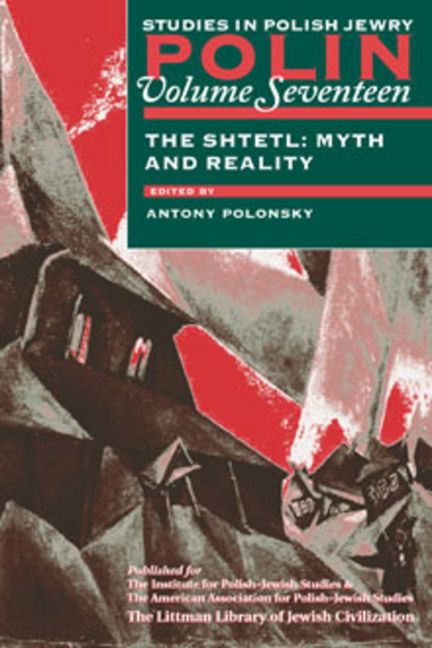Book contents
- Frontmatter
- Dedication
- Editors and Advisers
- Preface
- Polin
- Polin: Studies inPolish Jewry
- Contents
- Note on Place Names
- Note on Transliteration
- List of Abbreviations
- PART I THE SHTETL: MYTH AND REALITY
- PART II NEW VIEWS
- PART III DOCUMENTS
- PART IV THE SIXTY-FIFTH ANNIVERSARY OF EVENTS IN PRZYTYK: A DEBATE
- PART V REVIEWS
- Chone Shmeruk, Hakeriyah lenavi: meḥkerei historiyah vesifrut, edited by Israel Bartal; Chone Shmeruk, Ayarot ukerakhim: perakim beyetsirato shel shalom aleikhem, edited by Chava Turniansky
- Anna Michałowska, Między demokracją oligarchią: Władze gmin żydowskich w Poznaniu i Swarzędzu
- Magdalena Sitarz, Yiddish and Polish Proverbs: Contrastive Analysis Against Cultural Background
- Shmuel Feiner and David Sorkin (eds.), New Perspectives on the Haskalah
- Brian Porter, When Nationalism Began to Hate: Imagining Modern Politics in Nineteenth-Century Poland
- Irena Janicka-Świderska, Jerzy Jarniewicz, and Adam Sumera (eds.), Jewish Themes in English and Polish Culture
- Nancy L. Green (ed.), Jewish Workers in the Modern Diaspora
- Gertrud Pickhan, ‘Gegen den Strom’. Der Allgemeine Jüdische Arbeiterbund ‘Bund’ in Polen, 1918–1939
- Anna Cichopek, Pogrom Żydów w Krakowie, 11 sierpnia 1945 r.
- Michał Horoszewicz, ‘Przez dwa millenia do rzymskiej synagogi’: Szkice o ewolucji postawy Kościoła katolickiego wobec Żydów i judaizmu
- OBITUARIES
- Notes on the Contributors
- Glossary
- Index
Magdalena Sitarz, Yiddish and Polish Proverbs: Contrastive Analysis Against Cultural Background
from PART V - REVIEWS
- Frontmatter
- Dedication
- Editors and Advisers
- Preface
- Polin
- Polin: Studies inPolish Jewry
- Contents
- Note on Place Names
- Note on Transliteration
- List of Abbreviations
- PART I THE SHTETL: MYTH AND REALITY
- PART II NEW VIEWS
- PART III DOCUMENTS
- PART IV THE SIXTY-FIFTH ANNIVERSARY OF EVENTS IN PRZYTYK: A DEBATE
- PART V REVIEWS
- Chone Shmeruk, Hakeriyah lenavi: meḥkerei historiyah vesifrut, edited by Israel Bartal; Chone Shmeruk, Ayarot ukerakhim: perakim beyetsirato shel shalom aleikhem, edited by Chava Turniansky
- Anna Michałowska, Między demokracją oligarchią: Władze gmin żydowskich w Poznaniu i Swarzędzu
- Magdalena Sitarz, Yiddish and Polish Proverbs: Contrastive Analysis Against Cultural Background
- Shmuel Feiner and David Sorkin (eds.), New Perspectives on the Haskalah
- Brian Porter, When Nationalism Began to Hate: Imagining Modern Politics in Nineteenth-Century Poland
- Irena Janicka-Świderska, Jerzy Jarniewicz, and Adam Sumera (eds.), Jewish Themes in English and Polish Culture
- Nancy L. Green (ed.), Jewish Workers in the Modern Diaspora
- Gertrud Pickhan, ‘Gegen den Strom’. Der Allgemeine Jüdische Arbeiterbund ‘Bund’ in Polen, 1918–1939
- Anna Cichopek, Pogrom Żydów w Krakowie, 11 sierpnia 1945 r.
- Michał Horoszewicz, ‘Przez dwa millenia do rzymskiej synagogi’: Szkice o ewolucji postawy Kościoła katolickiego wobec Żydów i judaizmu
- OBITUARIES
- Notes on the Contributors
- Glossary
- Index
Summary
The generations born and brought up in Poland after 1945 find it difficult to imagine their country as a commonwealth of many nations, which it was up to the time of the Second World War. Although throughout the ages the same territory had been inhabited by a variety of national groups, the relations between them were often far from perfect. Nevertheless, representatives of these distinct nationalities were in contact with each other, and—whether consciously or not—the diverse cultural models influenced each other. The languages were also exposed to such mutual influences. The past decade has witnessed a considerable increase in research into foreign influences on the Polish language. In most cases such studies focus on the contemporary and historical variety of Polish spoken in the eastern borderlands, that is, in the territories of present-day Belarus, Lithuania, and Ukraine. Scholars have also researched the Polish language spoken by other national groups and the varieties of the language spoken abroad. Studies into the issue of linguistic influences between Polish and Yiddish have also been developing. Works such as Maria Brzezina's Polszczyzna Żydòw (‘The Polish Language Spoken by the Jews’ (Warsaw, 1986)) and Ewa Geller's Jidysz:Język Żydòw polskich (‘Yiddish: The Language of Polish Jews’ (Warsaw, 1994)) help us to realize the intensity of the linguistic influences between the languages of Poles and Jews, but at the same time they clearly show how many research problems await investigation. This is why every new publication that contributes to a better understanding of the issues is welcome. One of the latest works of this kind is Yiddish and Polish Proverbs:
Contrastive Analysis Against Cultural Background, by Magdalena Sitarz, a Yiddish scholar at the Jagiellonian University in Krakòw.
The author's objective is to shed new light on Polish–Jewish cultural relations as well as to put into practice and modify new methods of classifying and analysing proverbs (pp. 9–12). The analysis draws upon a systematic comparison of Polish and Jewish proverbs that mirror mutual cultural influences.
- Type
- Chapter
- Information
- The Shtetl: Myth and Reality , pp. 422 - 426Publisher: Liverpool University PressPrint publication year: 2004



